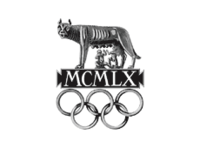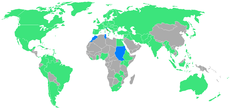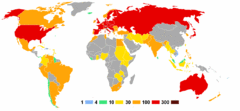- 1960 Summer Olympics
-
Games of the XVII Olympiad 
Host city Rome, Italy Nations participating 83 Athletes participating 5,338
(4,727 men, 611 women)Events 150 in 17 sports Opening ceremony August 25 Closing ceremony September 11 Officially opened by President Giovanni Gronchi Athlete's Oath Adolfo Consolini Olympic Torch Giancarlo Peris Stadium Stadio Olimpico The 1960 Summer Olympics, officially known as the Games of the XVII Olympiad, was an international multi-sport event held from August 25 to September 11, 1960 in Rome, Italy. Rome had been awarded the organization of the 1908 Summer Olympics, but after the 1906 eruption of Mount Vesuvius, was forced to decline and pass the honors to London.
Contents
Host city selection
Main article: Bids for the 1960 Summer OlympicsOn June 15, 1955, at the 50th IOC Session in Paris, France, Rome beat out Lausanne, Detroit, Budapest (being the first city of the Eastern Bloc to bid for the Olympic Games), Brussels, Mexico City and Tokyo for the rights to host the Games.[1]
1960 Summer Olympics bidding results[2] City Country Round 1 Round 2 Round 3 Rome  Italy
Italy15 26 35 Lausanne  Switzerland
Switzerland14 21 24 Detroit  United States
United States6 11 — Budapest  Hungary
Hungary8 1 — Brussels  Belgium
Belgium6 — — Mexico City  Mexico
Mexico6 — — Tokyo  Japan
Japan4 — — Highlights
- Soviet gymnasts won 15 of 16 possible medals in women's gymnastics
- Danish sailer Paul Elvstrøm won his fourth straight gold medal in the Finn class. The only others to emulate his performance in an individual event are Al Oerter, Carl Lewis and, if the Intercalated Games of 1906 are included, Ray Ewry.
- Finnish Vilho Ylönen, a field shooter, shot a bullseye to a wrong target and was dropped from the second place to fourth.
- The future Constantine II, King of Greece, won his country a gold in sailing Dragon Class.
- Fencer Aladár Gerevich of Hungary won his sixth consecutive gold medal in the team sabre event (1932–1936, 1948–1960).
- Wilma Rudolph, a former polio patient, won three gold medals in sprint events on the track. She was acclaimed as "the fastest woman in the world".
- Abebe Bikila of Ethiopia won the marathon bare-footed to become the first black African Olympic champion.
- Cassius Clay, later known as Muhammad Ali, won boxing's light-heavyweight gold medal.
- Ramon "Buddy" Carr was one of the boxing coaches that led this team to winning gold.
- The Japanese men's gymnastics team won the first of five successive golds, the last of which was won in 1976, in Montreal.
- South Africa appeared in the Olympic arena for the last time under its apartheid regime. It would not be allowed to return until 1992, after the abandonment of apartheid and during the transition to majority rule.
- The United States men's national basketball team -- led by future Basketball Hall of Famers Walt Bellamy, Jerry Lucas, Oscar Robertson and Jerry West -- captured its fifth straight Olympic gold medal.
- Swedish canoer Gert Fredriksson won his sixth Olympic title.
- Danish cyclist Knud Enemark Jensen collapsed during his race under the influence of Roniacol and later died in the hospital. It was the second time an athlete died in competition at the Olympics, after the death of Portuguese marathon runner Francisco Lázaro at the 1912 Summer Olympics.[3]
- Australian athlete Herb Elliott won the men's 1500 meters in one of the most dominating performances in Olympic history.
- American athlete Rafer Johnson defeated his rival and friend C.K. Yang in one of the greatest decathlon events in Olympic history.
- Peter Camejo, a 2004 American vice-presidential candidate for the Green Party, competed in yachting for Venezuela.
- Armin Hary won the 100 metres in an Olympic record time of 10.2 seconds.
- Pakistan broke India's dominance in Olympic Men's Field Hockey by becoming the first team in history to beat India in Olympic Field Hockey since 1928 and winning its first ever Olympic gold medal in the process. India had already won 6 previous hockey golds in the Summer Olympics.
- The future Sofía of Spain represented Greece in sailing events.
- Jeff Farrell of the United States won two gold medals in swimming after undergoing an emergency appendectomy six days before the Olympic Trials.[4]
- Singapore competed for the first time under its own flag, which was to become its national flag after independence, as the British had granted it self government a year earlier. Coincidentally, it was the first time (and only time until 2008) an athlete from Singapore won an Olympic medal, when Tan Howe Liang won silver in the Weightlifting lightweight category.
- American wrestlers Shelby Wilson, and Doug Blubaugh both won gold medals in their respective weight classes. Both men were raised in the town of Ponca City, Oklahoma and wrestled together through high school and college.
- CBS paid $394,000 for the right to broadcast the Games in the United States.[5]
Venues
Main article: Venues of the 1960 Summer Olympics- Olympic Stadium² (Stadio Olimpico) - opening/closing ceremonies, athletics, equestrian events
- Flaminio Stadium¹ (Stadio Flaminio) - football finals
- Swimming Stadium¹ - swimming, diving, water polo, modern pentathlon (swimming)
- Sports Palace¹ (Palazzo dello sport) - basketball, boxing
- Olympic Velodrome¹ - cycling (track), field hockey
- Small Sports Palace¹ (Palazzetto dello Sport) - basketball, weightlifting
- Marble Stadium² (Stadio dei Marmi) - field hockey preliminaries
- Baths of Caracalla - gymnastics
- Basilica of Maxentius - wrestling
- Palazzo dei Congressi - fencing
- Umberto I Shooting Range¹ - modern pentathlon (shooting), shooting (pistol/ rifle)
- Roses Swimming Pool¹ (Piscina delle Rose) - water polo
- Lake Albano, Castelgandolfo - rowing, canoeing
- Piazza di Siena, Villa Borghese gardens - equestrian (dressage, eventing - jumping, jumping - individual)
- Pratoni del Vivaro, Rocca di Papa - equestrian (eventing)
- Gulf of Naples, Naples - yachting
- Communal Stadium, Florence - football/soccer preliminaries
- Communal Stadium, Grosseto - football/soccer preliminaries
- Communal Stadium, L'Aquila - football/soccer preliminaries
- Ardenza Stadium, Livorno - football/soccer preliminaries
- Adriatico Stadium, Pescara - football/soccer preliminaries
- Saint Paul's Stadium, Naples - football/soccer preliminaries
- Campo Tre Fontane - field hockey preliminaries
- Acqua Santa Golf Club Course - modern pentathlon (running)
- Arch of Constantine - athletics (marathon finish)
- Cesano Infantry School Range - shooting (300 m free rifle)
- Lazio Pigeon Shooting Stand - shooting (trap shotgun)
- Passo Corese - modern pentathlon (riding)
- Grande Raccordo Anulare - athletics (marathon)
- Via Appian Antica - athletics (marathon)
- Via Cassia - cycling (individual road race)
- Via Flaminia - cycling (individual road race)
- Via Cristoforo Colombo - athletics (marathon), cycling (road team time trial)
- Via di Grottarossa - cycling (individual road race)
¹ New facilities constructed in preparation for the Olympic Games. ² Existing facilities modified or refurbished in preparation for the Olympic Games.
Events and medals awarded
See for individual sports and for medal winners, ordered by sport:
Participating nations
A total of 84 nations participated at the Rome Games. Athletes from Morocco, San Marino, Sudan, and Tunisia competed at the Olympic Games for the first time. Suriname also made its first Olympic appearance, but its lone athlete withdrew from competition, leaving a total of 83 nations that actually competed. Athletes from Barbados, Jamaica and Trinidad and Tobago would represent the new (British) West Indies Federation, competing as "Antilles", but this nation would only exist for this single Olympiad. Athletes from East Germany and West Germany would compete as the United Team of Germany from 1956-1964. The number in parentheses indicates the number of participants that each country contributed.
Medal count
Main article: 1960 Summer Olympics medal tableThese are the top ten nations that won medals at these Games:
Rank Nation Gold Silver Bronze Total 1  Soviet Union
Soviet Union43 29 31 103 2  United States
United States34 21 16 71 3  Italy
Italy13 10 13 36 4  Germany
Germany12 19 11 42 5  Australia
Australia8 8 6 6  Turkey
Turkey7 2 0 9 7  Hungary
Hungary6 8 7 21 8  Japan
Japan4 7 7 18 9  Poland
Poland4 6 11 21 10  Czechoslovakia
Czechoslovakia3 2 3 8'Bold text See also
- 1960 Summer Paralympics
- 1960 Winter Olympics
- Olympic games celebrated in Italy
- 1956 Winter Olympics – Cortina D'Ampezzo
- 1960 Summer Olympics – Rome
- 2006 Winter Olympics – Turin
Notes
- ^ IOC Vote History
- ^ "Past Olympic host city election results". GamesBids. Archived from the original on 17 March 2011. http://www.webcitation.org/5xFvf0ufx. Retrieved 17 March 2011.
- ^ Maraniss, David (2008). Rome 1960: The Olympics That Changed the World (1st ed.). New York City, NY: Simon & Schuster. p. 138. ISBN 978-1-4165-3407-5.
- ^ "Stories About USMS Swimmers". Usms.org. http://www.usms.org/hist/sto/index.php?ID=11&srt=. Retrieved 2011-03-23.
- ^ "OLYMPICS AND TELEVISION - The Museum of Broadcast Communications". Museum.tv. http://www.museum.tv/archives/etv/O/htmlO/olympicsand/olympicsand.htm. Retrieved 2011-03-23.
References
- "Rome 1960". Olympic.org. International Olympic Committee. http://www.olympic.org/en/content/Olympic-Games/All-Past-Olympic-Games/Summer/Rome-1960.
- "All the Medallists since 1896". Olympic.org. International Olympic Committee. http://www.olympic.org/en/content/All-Olympic-results-since-1896/?AthleteName=&Games=1333832&Country=&Sport=&TargetResults=true&resultsPageIPP=30.
External links
- "Rome 1960". Olympic.org. International Olympic Committee. http://www.olympic.org/en/content/Olympic-Games/All-Past-Olympic-Games/Summer/Rome-1960.
- The program of the 1960 Rome Olympics
Preceded by
MelbourneSummer Olympic Games
Rome
XVII Olympiad (1960)Succeeded by
TokyoCategories:- 1960 Summer Olympics
- Sport in Rome
- Sports festivals in Italy
- Olympic Games in Italy
Wikimedia Foundation. 2010.


